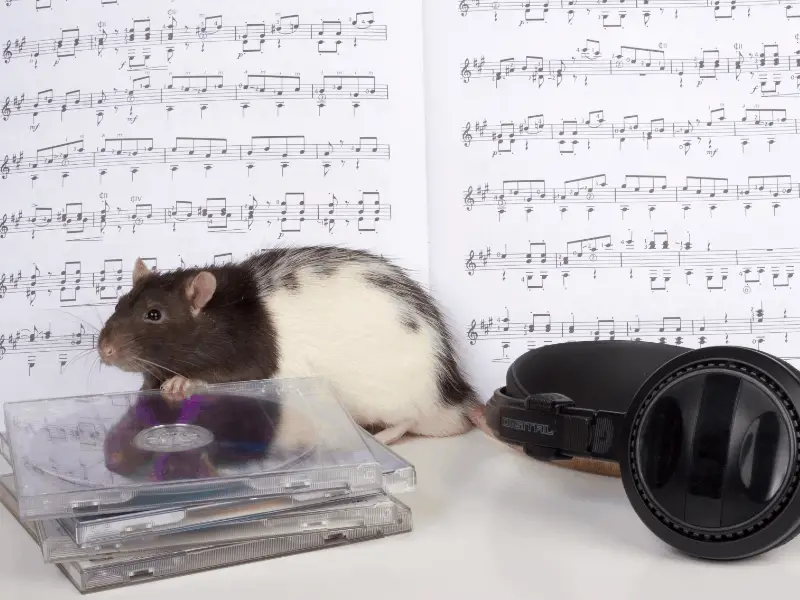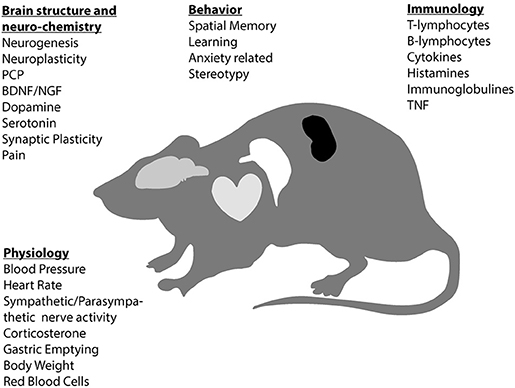A rat’s hearing is undeniably ultra-sensitive compared to a human’s hearing, and this certainly causes them to experience music in an unimaginably different way compared to us. Science shows that certain types of music can have a marked positive outcome in rats. Let’s have a look at what the research says and how you can apply it to your own pet rats.
Studies have found rats to have a great affinity to certain types of musical sounds. Rats listening to music can experience many benefits, including increased learning ability, reduced stress, increased immune system function, and a lower incidence of certain diseases.
Music has gotten growing interest over the past few decades as a health and wellness intervention, and rats are commonly the subject of these types of studies. This is great because it gives us an insight into how rats perceive music and how we can use it to the advantage of our pet rats.

What Type of Music do Rats like?
Asking the rat-owner community, you will get mixed reviews. It also seems pretty clear that different rats have a liking for different types of music.
One rat owner noticed that his one rat appeared more playful and active when he is playing music from musicals, while his other rat seems to enjoy jazz more. Some rats have been known to love sitting on their guitar-playing owner’s lap, and others love listening to American Idol with their owners.
The research leans toward classical music as being a favorite, with Jazz being used in one study that showed rats under the influence of a certain drug preferring Jazz. Maybe I am slightly biased towards classical music as I sit writing this article listening to my favorite mix of classical hits, but the researchers tend to agree.
Upbeat and euphoric house music was also undeniably enjoyed by rats, as one study found that it increases the feel-good neurotransmitters dopamine and serotonin.
It also seems that rats tend to prefer high-frequency music compared to low-frequency music. Rats, in particular, show an affinity for sound at 50 kHz. This frequency is far above the human hearing range, and rats make sounds at this frequency when they are happy. Basically rat-laughter.
So Rats tend to like soft, gentle music, but many rat owners find that their rats grow a liking towards certain types of music the more they are exposed to certain sounds.
One study by Harvard has found that rats exposed to music from the age of 10 days old showed a greater affinity for music later in their life. They naturally gravitated towards music. Rats that did not get exposed to music at a young age had mixed responses.
What Type of Music Do Rats Dislike?
Rats show an aversion to loud noises or abrupt sounds and will usually run away or hide from loud noises. Rats find loud noises stressful. You can read more about stress in rats and how to help alleviate stress in this article.
Low tones or low-frequency music will likely not be in your rat’s favorite playlist due to their ultra-sensitive hearing. So go easy on the bass- you might even want to adjust your speaker’s equalizer to have a softer bass setting.
How Do I Know Whether my Rat Likes Music?
Common signs that rats show when they enjoy what they are hearing are similar to the signs you will notice in a happy or relaxed rat.
- Bruxing (grinding of the teeth or chewing sounds)
- Eye-boggling (bulging of eyes)
- Seeking the source of the music or moving toward the speakers
- Play fighting with cage mates
- Increased activity level
- Ears hanging relaxed on both sides of the head
Signs That Your Pet Rat Dislikes The Music
Again, these signs would be similar to those you will see in a rat that is frightened or stressed and will coincide with the period shortly after you pressed play.
Signs of a dislike towards the sound that your rate is hearing include hiding away, uncanny vocalization, or raising of fur on top of the spine.

What Benefits Does Music have for Rats?
A lot of the information below comes from an excellent, comprehensive systematic review by Kuhlmann et al. (2018). They have a very extensive list of references in their article, and I highly recommend it if you are interested in the nitty-gritty science stuff.
1. Music Reduces Stress
This should be no surprise as most people are familiar with the soothing effect of relaxing music. Just think of how the velvety sounds of Enya can make your troubles melt away. The good news is that rats can benefit from the same relaxing effects of music that humans do.
Music helped to reduce blood pressure and heart rate and reduce blood levels of the stress hormone corticosterone (the rat equivalent of cortisone in humans). This is undeniably so, as 16 studies looking at the effect of music on physiologic markers in rats found improvement in markers of stress, namely blood pressure, heart rate, and blood corticosterone levels.
Have a look at the Youtube Channel PetTunes – Music for Pets and check out their Rat Songs playlist. You don’t necessarily have to play music made specifically for rats to have a relaxing effect, but it’s interesting to listen to something that someone created specifically for rats. And most fans of the rat playlist certainly agree that their rats respond in a positive way when this music is played.
Music also showed to reduce stereotypical behavior under experimental conditions.
Stereotypical behavior is repetitive or apparently non-sensical behavior, such as constant running up and down in an enclosure, biting at cage wires, or overgrooming to the point of causing hair loss, and is often a symptom of chronic stress or frustration. I must add that if your rat is showing any stereotypical behavior, you need to seek veterinary advice as it could be an indication of something major wrong.
2. Music Enhances Learning Ability
A study found that rats that were exposed to Mozart’s piano sonata, K.448 learned to run mazes faster and with fewer errors compared to rats who were exposed to the mere minimalistic compositions of Philip Glass or to white noise.
This is known as the Mozart effect, a widely researched phenomenon of increased performance in certain intelligence tests after listening to the icons 18th Century composers’ music.
In humans, the Mozart effect has been shown in a group of college students who scored significantly higher on a spatial intelligence test but only for up to 15 minutes after listening to the music.
In contrast, rats that were exposed to the music for the first 60 days of their life had permanent changes in their neural machinery. They showed increased brain-derived neurotrophic factor (BDNF – a powerful protein that helps nerve cells grow and heal) and, in turn, increased neuroplasticity.
3. Music Enhances the Functioning of The Immune System
Exposure to music under experimental conditions leads to an improvement of certain immune system markers. The markers that showed improvement can translate into better handling of new viral and bacterial infections and even better elimination of potentially malignant cells. (McCarthy et al., 1992; Nunez et al., 2002; Zhang et al., 2013).
Exposing rats to rock music, in contrast, leads to a decrease of markers indicating white blood cell function and, therefore, slightly decreased immune system function.
Opera music, classical music, Korean Buk music, and gong-tone sounds all improved immune system function in the listening rats.
Asthmatic rats showed a decrease in blood markers indicating asthma, suggesting that music had a beneficial effect on their coping with asthma. (Lu et al., 2010).
4. Music Can Help Your Rat to Bond With You
Some rats love to sit on their owner’s lap while they play guitar or will stare at their owners while singing. It seems that the general consensus is that rats love it when their owners make lyrical sounds and seem to be attracted to it.
I know of a rat owner who used to sing softly to her foster rats in order to win their trust. She helped rehabilitate many rescue rats this way.
Any situation where you can provide your rat with something they enjoy or find soothing will help to build trust and bonding.
5. Listening to Music Increases The Life Expectancy of Rats
Rats who listened to music in a lab all their lives lived significantly longer compared to their counterparts who kept silent. This was mainly due to a lower incidence of terminal diseases such as metastatic cancer. Rats exposed to opera and classical music had a lower rate of spread of cancer and had prolonged survival and general.
This may also be a secondary effect of lowering stress and enhancing immune system function. Rats are prone to cancer, so this is more than enough reason for me to turn up the sound on your rat’s favorite playlist.

Conclusion
Music is an incredibly powerful form of art, and the more we research the effect music has on us, the more we seem to find a never-ending list of benefits.
I hope this information encourages you to experiment with music around your rats. Their taste in music might just surprise you, and the benefits you will reap.
You may also find the following articles helpful:
- Are Tumors/Cancer Painful to Rats?
- Pet Rat Emotions: Scientific Proof They Feel Grief and Empathy
- Signs That Your Pet Rat Is In Pain And What You Can Do To Help

Resources
- Camargo, A., Lima, D., Dal Magro, D., Seubert, J., Cruz, J. and Cruz, J., 2013. Adjuvant effects of classical music on simvastatin induced reduction of anxiety but not object recognition memory in rats. Psychology & Neuroscience, 6(3), pp.403-410. https://www.researchgate.net/publication/274751648_Adjuvant_effects_of_classical_music_on_simvastatin_induced_reduction_of_anxiety_but_not_object_recognition_memory_in_rats
- Celma-Miralles, A. and Toro, J., 2020. Discrimination of temporal regularity in rats (Rattus norvegicus) and humans (Homo sapiens). Journal of Comparative Psychology, 134(1), pp.3-10. https://pubmed.ncbi.nlm.nih.gov/31589060/
- Chen, S., Liang, T., Zhou, F., Cao, Y., Wang, C., Wang, F., Li, F., Zhou, X., Zhang, J. and Li, C., 2019. Regular Music Exposure in Juvenile Rats Facilitates Conditioned Fear Extinction and Reduces Anxiety after Foot Shock in Adulthood. BioMed Research International, 2019, pp.1-10. https://www.hindawi.com/journals/bmri/2019/8740674/
- Kühlmann, A., de Rooij, A., Hunink, M., De Zeeuw, C. and Jeekel, J., 2018. Music Affects Rodents: A Systematic Review of Experimental Research. Frontiers in Behavioral Neuroscience, 12. https://www.frontiersin.org/articles/10.3389/fnbeh.2018.00301/full
- Psyrdellis, M., Diaz, Abrahan, V., Cetratelli, C., and Justel, N., 2017. Rock influences spatial memory in adult rats, while classical music do not. Psicológica (2017), 38, 177-193. https://www.uv.es/psicologica/articulos2.17/1PSYRDELLIS.pdf
- STEELE, K., 2003. Do Rats Show a Mozart Effect?. Music Perception, 21(2), pp.251-265.https://www.jstor.org/stable/10.1525/mp.2003.21.2.251
